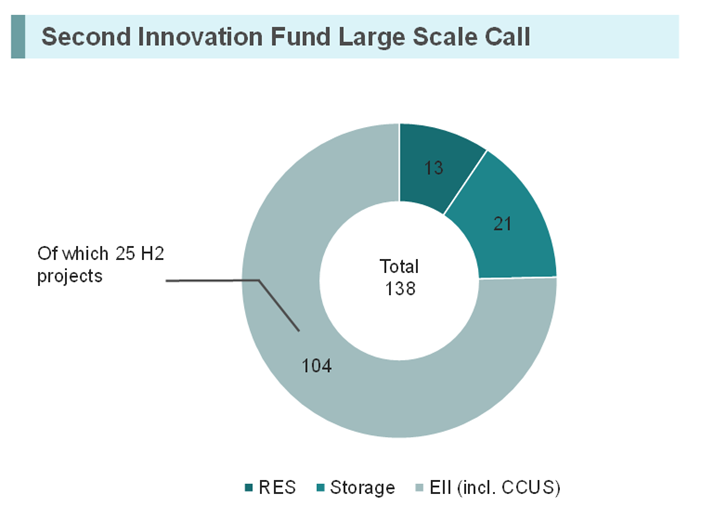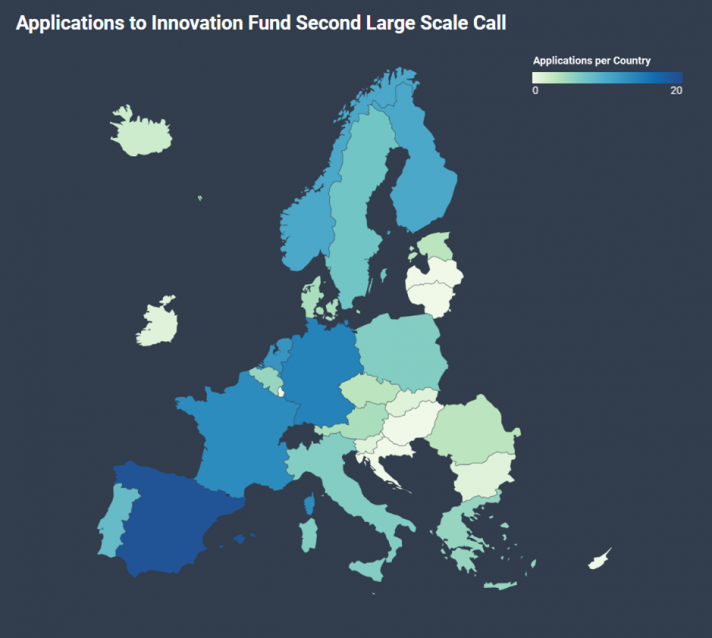
In response to the Innovation Fund’s second call for large-scale projects, the European Commission received 138 applications for innovative clean tech projects in all eligible categories: renewable energy, energy-intensive industries, energy storage, and carbon capture and storage.
- In the category of energy-intensive industries, there are 25 proposals focussed on hydrogen, while the CCS/CCU projects are categorised in different sectors depending on the CO2 source, therefore, they are not shown on this graph. Projects can be cross-sectoral, i.e. implement an innovative clean tech solution in several sectors, but still need to be classified under one sector.
The 138 project proposals come from almost all EU Member States as well as Norway and Iceland. The total funding requested amounts to EUR 12.1 billion. Of the applications received, around 15 are cross-sectoral, and over 50 projects produce at least two different products, such as e-fuels, chemicals, hydrogen, biofuels, electricity, or bio-based products. This shows the wide scope of the Innovation Fund and the extensive contribution it can make to the decarbonisation pathways of multiple sectors, regions and Member States.
The proposed projects promise to reduce around 712 million tonnes of CO2 during their operating period under the Innovation Fund.
Although the Innovation Fund’s second large scale call received around half as many applications as the first, the promised emission reductions are only around 40% less, demonstrating the quality of applications in the second call. This corresponds to the aim of the Innovation Fund to support flagship European clean tech projects with a high decarbonisation impact across many sectors of the economy.
The funding of projects under this Innovation Fund call will help boost the EU’s green recovery, deliver on the EU climate goals under the European Green Deal, and reinforce European technological leadership on a global scale.
Mauro Petriccione, Director-General for DG Climate Action, said: “We are very happy with the number of projects applying for the second Innovation Fund call. This shows that innovative European companies’ interest in investing in clean tech remains strong. The variety of projects and technological solutions is impressive, and indicates that there are multiple decarbonisation pathways available in multiple sectors, regions, Member States, and value chains. Innovative and forward-thinking European businesses clearly want to take action for the climate, and the EU is there to support them.”
Next steps:
The second call for large-scale projects closed on 3 March 2022. The next step is to check the admissibility and eligibility of all submissions. Proposals that fulfil the admissibility and eligibility conditions will be evaluated by external evaluators against the award criteria. Proposals will be evaluated as follows: firstly on the degree of innovation, then on greenhouse gas emission reductions and maturity, and finally on scalability and cost efficiency. This approach will ensure that the projects selected are sufficiently innovative and mature, and have the potential to significantly reduce emissions and be replicated.
Applicants will be informed about the results of the evaluation in the third quarter of 2022. Rejected proposals that have the potential to improve their maturity may be invited for the project development assistance provided by the European Investment Bank. Grants will be awarded in the fourth quarter on 2022.
For the second time, the Innovation Fund is also opening a call focused on small-scale projects with total capital costs below EUR 7.5 million. It will pool together EUR 100 million and is expected to be launched on 31 March 2022.
Background:
Funded by revenues from the auction of emission allowances from the EU’s Emissions Trading System, the Innovation Fund aims to create the right financial incentives for companies and public authorities to invest now in the next generation of low-carbon technologies and give EU companies a first-mover advantage to become global technology leaders.
The Innovation Fund is implemented by the European Climate, Infrastructure and Environment Executive Agency (CINEA), while the European Investment Bank provides project development assistance to promising projects that are not ready for full application.
More Information:
Details
- Publication date
- 11 March 2022
- Author
- Directorate-General for Climate Action


